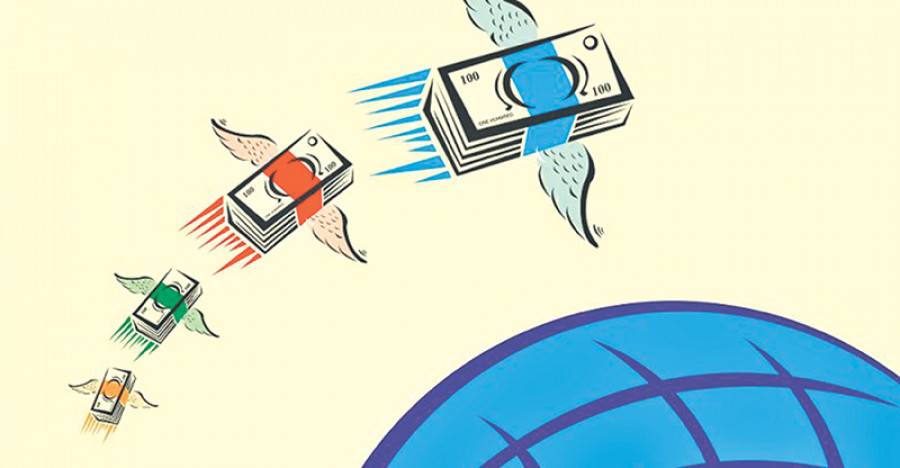

Nepal had witnessed a decline in its foreign exchange reserves for three consecutive months since the current 2021-22 fiscal year started in mid-July, raising concerns about the country’s long-term ability to buy foreign goods and services.
A constant fall in the inflow of remittances amid the lingering COVID-19 pandemic, the biggest source of foreign exchange earnings for Nepal, and surging imports during the same period were contributing to the dire situation, according to Nepal Rastra Bank, the central bank of the country.
The gross forex reserves decreased by 6.5 percent to 10.98 billion U.S. dollars in mid-October from 11.75 billion dollars at the beginning of the current fiscal year, noted a new report released by the central bank.
The volume fell by 2.8 percent and 5.2 percent respectively in the first and second months of the current fiscal year.
According to the central bank, the current forex reserves are enough for a sustaining import of goods and services for 7.8 months, just above the minimum threshold of seven months set by the bank through the monetary policy for the current fiscal year.
“It is a really worrying trend for the economy, as Nepal’s ability to buy foreign goods and services has weakened,” Keshav Acharya, a senior economist, told Xinhua.
“The time has come for the Nepali government and central bank to take firm action to reverse this situation,” he said.
Nepal’s import-dependent economy heavily relies on imported goods, including not only consumer goods but also industrial raw materials and machinery. Economic activities in the country are rebounding as new COVID-19 cases have fallen to hundreds from thousands in recent months, boosting demand for large quantities of foreign goods.
Imports grew by 63.7 percent to 478.52 billion Nepali rupees (4 billion U.S. dollars) during the first three months of the current fiscal year, according to the central bank data.
While Nepal’s exports surged by 109.5 percent, the earnings were a meager 65 billion rupees (543 million U.S. dollars).
“Our earnings from the exports are insignificant to make up losses in foreign exchange reserves due to surging imports,” said Acharya.
Income from remittances and tourism revenues had declined due to COVID-19 in the past months, which was making things worse.
Money sent from abroad had dipped by 7.7 percent to 2.02 billion dollars during the first three months of the current fiscal year, in contrast with a rise of 7.6 percent during the same period of the prior fiscal year.
During the first and second months of the current fiscal year, the remittance inflows fell by 17.5 percent and 5.8 percent respectively, according to the central bank report.
Remittances were expected to grow by the end of the third month as Nepali migrant workers were supposed to send back large amounts of money for Dashain and Tihar, the two largest festivals in the country.
The inflows fell though as many as 67,316 Nepali workers worked abroad in the first quarter of the current fiscal year, as against just 1,880 workers during the same period of the last fiscal year.
“This indicates that something wrong is happening in bringing in remittances through formal banking channels,” observed Acharya.
Earnings from the tourism sector stood at 35.4 million dollars during the first three months of the current fiscal year, down sharply from 152.8 million dollars during the same period of the 2019-20 fiscal year.
In the past fiscal year, the tourism sector generated a total of 61.7 million dollars only in revenues, as Nepal had been devastated by COVID-19 throughout the period, according to Nepal Rastra Bank.
Meanwhile, Nepal had just attracted 44.8 million dollars in foreign direct investments in the first three months of the current fiscal year, not enough to help swell its forex reserves.
Acharya suggested concrete measures by the government to discourage the import of luxury goods as well as agricultural products available in the country.
“I don’t suggest banning the import of certain goods, but other measures to discourage imports which are contributing to a massive foreign exchange decrease should be taken,” he said.
Dev Kumar Dhakal, spokesman for the central bank, agreed on the need to curb surging imports.
“We are discussing with the Nepal government about how to discourage the current massive imports,” he told Xinhua.